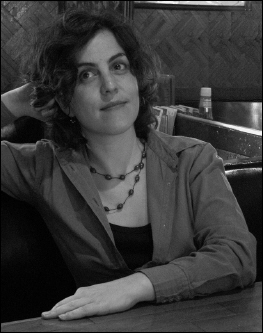
introducing readers to writers since 1995
April 02, 2005
Author2Author: Naama Goldstein and Pearl Abraham, conclusion
by Ron HoganWhile Pearl Abraham and Naama Goldstein were emailing each other about their books, an interesting digression from the first question about modernist language continued to work its way around the main discussion. I've tied the threads together here as a special bonus round in the dialogue....
 Naama Goldstein: Joyce's Ulysses makes good sense as an example to consider when discussing your book, with its abundant weave of genres and the scholarly hand at the loom. (Did you know the computer evolved from the loom? I didn't until recently.) I do have to say I truly love Leopold Bloom's thread in all of that or to put it more simply: I love Poldy. I love the life of that character. He utterly convinces me. I can't think how to put it better. He lives. And then there is also his job which he does so well and I don't mean the selling of ad space, or maybe I do: the selling of Joyce's brazen ideas. I mean the very idea of it, to present this bumbling and wise, native and foreign, cuckolded and dignified character as a patriarchal hero to unsettled modernity, or so I take it. From a parochial perspective I find it personally touching also that Bloom's a Jew, especially considering the much less affectionate metaphoric exploitation of the eternal(?) transplant by Joyce's contemporary, T.S. Eliot. What a progressive that Joyce was, although the same thing made him progress into absolute wackiness eventually, the innovative impulse run amok…
Naama Goldstein: Joyce's Ulysses makes good sense as an example to consider when discussing your book, with its abundant weave of genres and the scholarly hand at the loom. (Did you know the computer evolved from the loom? I didn't until recently.) I do have to say I truly love Leopold Bloom's thread in all of that or to put it more simply: I love Poldy. I love the life of that character. He utterly convinces me. I can't think how to put it better. He lives. And then there is also his job which he does so well and I don't mean the selling of ad space, or maybe I do: the selling of Joyce's brazen ideas. I mean the very idea of it, to present this bumbling and wise, native and foreign, cuckolded and dignified character as a patriarchal hero to unsettled modernity, or so I take it. From a parochial perspective I find it personally touching also that Bloom's a Jew, especially considering the much less affectionate metaphoric exploitation of the eternal(?) transplant by Joyce's contemporary, T.S. Eliot. What a progressive that Joyce was, although the same thing made him progress into absolute wackiness eventually, the innovative impulse run amok…
Pearl Abraham: I understand (from an essay I read) that the Hebrew word for computer comes from the word “m'kha'shefa,” referring to the computer’s witch-like powers, which really amuses me. And loom is the word my friend Aryeh Lev Stollman (The Illuminated Soul), a neuro-radiologist at Mt. Sinai Hospital, uses to describe the way the brain works. And, yes, stream of consciousness was never better than in the hands of James Joyce, with Poldy, and Molly in her aria, and Stephen of Portrait of an Artist, and Stephen Hero, which my students at Sarah Lawrence opted to read one year alongside Portrait. The point being that Bloom’s stream of consciousness really does capture our minds at work precisely because it is so interrupted and non-linear, so hop-about, brilliant really, but this was/is the rare exception rather the rule in stream of consciousness literature.
Naama Goldstein: You know, I hadn't ever considered the near-homophonousness of the Hebrew words for computer and witch. I do love happy linguistic coincidences. The root spelling of the words shares only one letter, though, so sadly I think the coincidence is only that. Mah'shev/computer, comes from the root HET SHIN VET, meaning think, compute and calculate. M'ha'shef/warlock and M'ha'shefa/witch, on the other hand, are built on the root letters HAF SHIN FEH, as in sorcery and magicmaking. Considering also the very recent vintage of modern Hebrew (and computers) I doubt superstition influenced the new coinage. Certainly your average computer geek in Israel's hyperdeveloped high-tech industry branch does not take his computations as voodoo, though s/he might enjoy leaving this impression on the company creatives.
your PayPal donation
can contribute towards its ongoing publication.